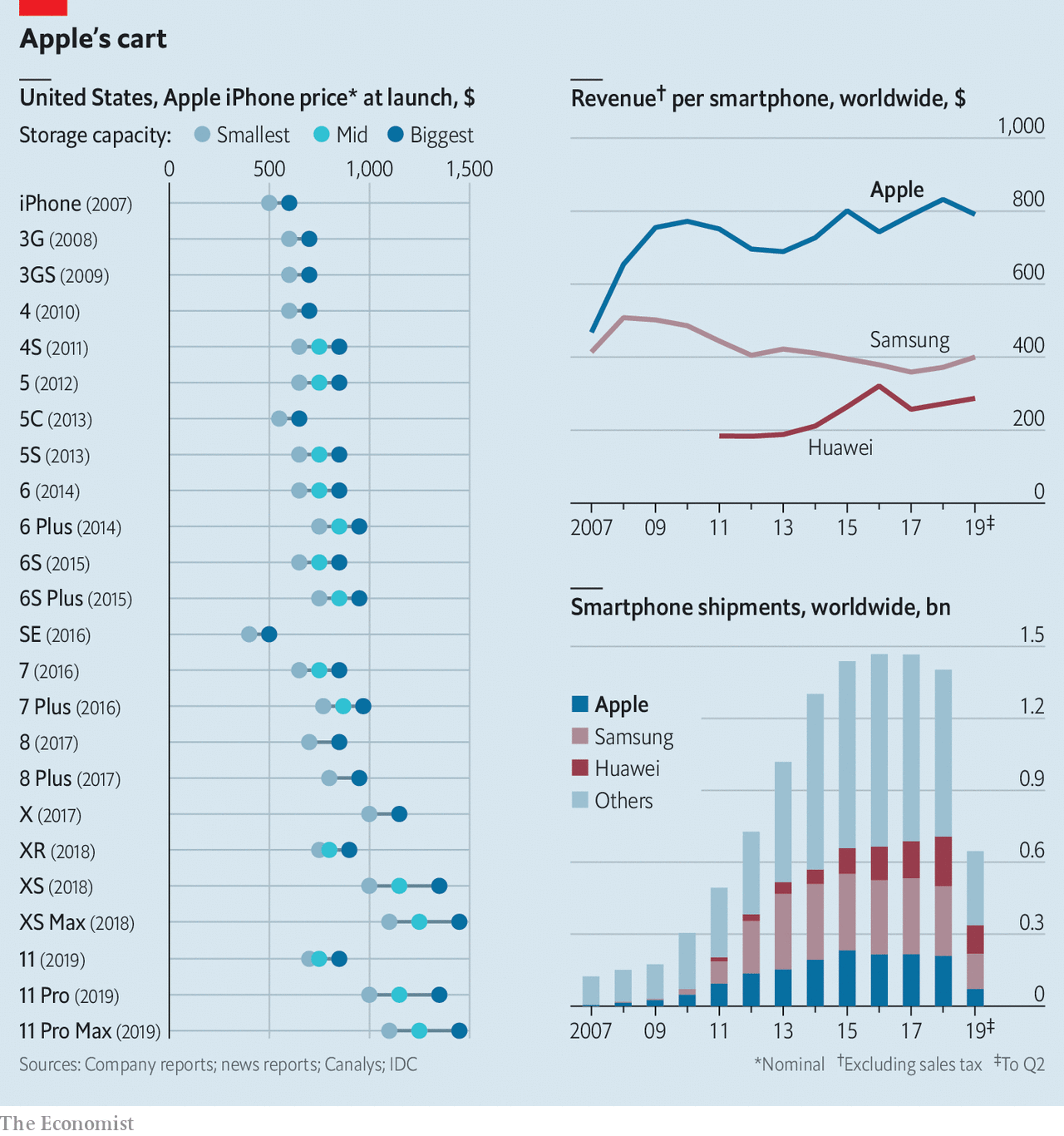本期经济学人杂志【商业】板块这篇题为《Tim Cook tries to reduce Apple’s dependence on devices》的文章关注苹果公司 9 月 10 日举办的新产品发布会,这回发布的三款升级版 iPhone 的价格较 2018 年旧款几乎持平,其中 iPhone 11 居然还降价了 1,000 RMB (见下图)。文章认为这主要是因为现在全球手机市场增长乏力,2018 款价格过高导致销量不佳这次苹果为了留住用户不敢再涨价。
现在的苹果新品发布会已经不再像十年前那样了,那时新 iPhone 的发布能激起人们宗教般的狂热。而刚刚过去的 9 月 10 日的苹果最新发布会上,苹果 CEO 库克一如往常穿着黑色针织套衫站在台上,向观众讲述公司最新的产品怎样在着改变世界。但台下不再有以前那样的欢呼声。
iPhone 11 系列看起来仅仅是以前旧模具的一些改进而已。当前全球消费者升级手机的频率已降低,手机厂商销售收入增速放缓,这给一直依赖卖高价设备的苹果公司带来了挑战。苹果公司给出的回应是减少硬件在收入中的比重,加大服务投资,增加服务在收入中的比重。比如苹果计划投资 60 亿美元发展流媒体,硬杠迪士尼和 Netflix。
近年来苹果手机一直在不停涨价,但从这次新发布的 iPhone 11 系列可以看出这种涨价势头在放缓。苹果因为其系统垄断可以从用户身上获取许多利益,如果你喜欢苹果生态,那你就不得不买苹果手机。相比之下使用谷歌的 Android 系统阵营中因为手机厂商众多,所以相互间的手机价格竞争激烈。这样看来,就目前而言苹果仍能保持丰厚利润。

Tim Cook tries to reduce Apple’s dependence on devices
Apple’s cart
Tim Cook tries to reduce Apple’s dependence on devices
And increase its revenues from services
Print edition | Business
Sep 12th 2019
Apple’s product launches are not what they used to be. A decade ago the unveiling of a new iPhone would inspire quasi-religious ecstasy; devotees would camp on pavements outside shops as the release date drew near. At the firm’s latest event, on September 10th, the format was the same: Apple’s boss stood on stage, clad in a regulation black jumper, and spoke of the world-changing power of the company’s latest wares. But the fizz was gone. The iPhone 11 looks like a merely incremental improvement on the models that have gone before it.
Smartphones have become boring. Consumers around the world are upgrading less frequently. Sales have stagnated (see chart). That poses a problem for Apple, which has built its success on charging eye-watering prices for aspirational, frequently replaced devices. Its response—to focus more on selling services and less on selling hardware—has been widely trailed. Those services comprise everything from extended warranties to the creation of an Apple-exclusive store for video games, and for streaming video, on which it plans to spend $6bn and which is designed to undercut rivals like Disney and Netflix.
The iPhone 11’s launch shows what that strategy means for the hardware side. Apple has been raising its prices for years, but that trend has slowed. The cheapest model of the iPhone 11 is the lowest-priced phone the company has launched in two years. That makes sense: a service-focused company needs a broad user-base. But it is a delicate balancing act. If prices fall too low, the firm will lose its aspirational glow (the top-of-the-range iPhone 11 Pro Max will cost you $1,449). At the same time, Apple benefits from a captive audience. Users of Google’s rival Android phones have many hardware-sellers to choose from, leading to fierce price competition. Those who prefer Apple’s ecosystem must buy iPhones. That should keep margins plump for the time being.
This article appeared in the Business section of the print edition under the headline"Are you being served?"
